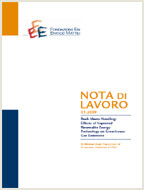Copenhagen and Beyond: Reflections on China’s Stance and Responses

17.06.2010
ZhongXiang Zhang
Q41, Q43, Q48, Q52, Q54, Q58, O53
Copenhagen Climate Negotiations, Emissions Reductions, Carbon Intensity Target, Binding Emissions Caps, Statistics on Energy and GDP, Coal and Energy Consumption, China, USA
Climate Change and Sustainable Development
Carlo Carraro
China had been singled out by Western politicians and media for dragging its feet on international climate negotiations at Copenhagen, the accusations previously always targeted on the U.S. To put such a criticism into perspective, this paper provides some reflections on China’s stance and reactions at Copenhagen. While China’s reactions are generally well rooted because of realities at home, some reactions could have been handled more effectively for a better image of China. The paper also addresses the reliability of China’s statistics on energy and GDP, the issue crucial to the reliability of China’s carbon intensity commitments. The paper discusses flaws in current international climate negotiations and closes with my suggestion that international climate negotiations need to focus on 2030 as the targeted date.
